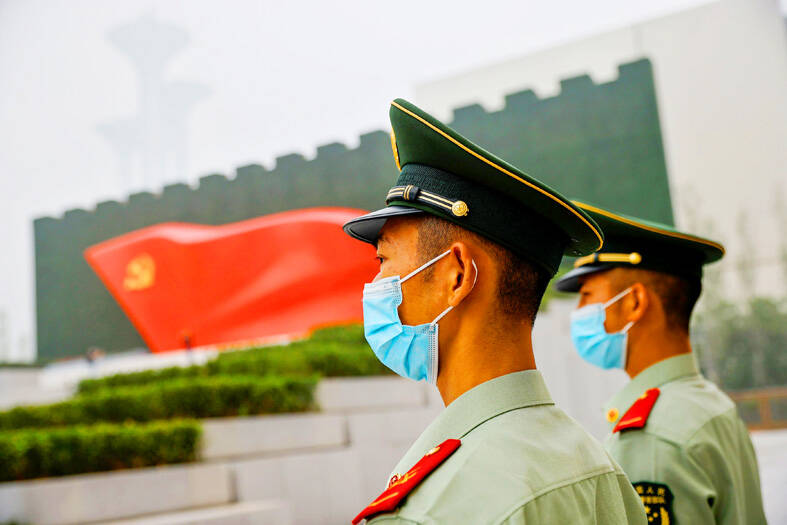Taiwanese who have recently traveled to China for tourism, to visit friends or relatives or for business reasons have been interrogated, detained and faced other forms of unreasonable treatment from Chinese officials, a source said on Sunday.
Among them was a Taiwanese who was detained for eight hours at an airport in China due to their research, which is related to religion, while others have had their travel documents for China canceled for a number of reasons, the source said.
In July, China expanded the scope of its counterespionage law, and recently announced a draft amendment to the law on the protection of state secrets.

Photo: Reuters
Beijing says that the law aims to further protect China’s state secrets, and counter the intelligence work of “hostile Western forces.”
State secrets were previously dispersed among units in China and managed independently, but the Chinese Communist Party (CCP) wants to amend the law to manage sensitive information centrally, the source said, adding that Beijing sees the centralization of information and resources as a way to prevent the party from weakening.
Under Chinese President Xi Jinping’s (習近平) rule, China has given top priority to national security, the source said.
“Chinese who attended Halloween activities this year and wore costumes were later visited at home by national security officials who wanted to know who organized the events,” the source said.
Chinese customs officials have also increasingly been interrogating people arriving from the US, Japan and other countries, they said.
“Taiwanese academics who were invited to China to participate in exchange activities were recently detained at the airport for questioning, and their laptops and mobile phones were all searched,” the source said.
“The CCP is particularly afraid of organized religions... If you bring a Bible or religious publications into China, you might face criminal prosecution,” they said.
Over the past year, China has increasingly interrogated foreigners entering the country, and many foreign experts and academics have been arrested arbitrarily, they said.
In related news, Taiwanese officials have been unable to secure information about Taiwanese National Party vice chairman Yang Chih-yuan (楊智淵), who was arrested on charges of “endangering national security” and “secession” in Wenzhou, China, in August last year.
Since his arrest, Beijing has refused to grant Yang’s family or Taiwanese officials access to him, the source said.
The Mainland Affairs Council called for Yang’s release in April after the Chinese Supreme People’s Procuratorate announced that it would indict him.

An essay competition jointly organized by a local writing society and a publisher affiliated with the Chinese Communist Party (CCP) might have contravened the Act Governing Relations Between the People of the Taiwan Area and the Mainland Area (臺灣地區與大陸地區人民關係條例), the Mainland Affairs Council (MAC) said on Thursday. “In this case, the partner organization is clearly an agency under the CCP’s Fujian Provincial Committee,” MAC Deputy Minister and spokesperson Liang Wen-chieh (梁文傑) said at a news briefing in Taipei. “It also involves bringing Taiwanese students to China with all-expenses-paid arrangements to attend award ceremonies and camps,” Liang said. Those two “characteristics” are typically sufficient

A magnitude 5.9 earthquake that struck about 33km off the coast of Hualien City was the "main shock" in a series of quakes in the area, with aftershocks expected over the next three days, the Central Weather Administration (CWA) said yesterday. Prior to the magnitude 5.9 quake shaking most of Taiwan at 6:53pm yesterday, six other earthquakes stronger than a magnitude of 4, starting with a magnitude 5.5 quake at 6:09pm, occurred in the area. CWA Seismological Center Director Wu Chien-fu (吳健富) confirmed that the quakes were all part of the same series and that the magnitude 5.5 temblor was

The brilliant blue waters, thick foliage and bucolic atmosphere on this seemingly idyllic archipelago deep in the Pacific Ocean belie the key role it now plays in a titanic geopolitical struggle. Palau is again on the front line as China, and the US and its allies prepare their forces in an intensifying contest for control over the Asia-Pacific region. The democratic nation of just 17,000 people hosts US-controlled airstrips and soon-to-be-completed radar installations that the US military describes as “critical” to monitoring vast swathes of water and airspace. It is also a key piece of the second island chain, a string of

The Central Weather Administration has issued a heat alert for southeastern Taiwan, warning of temperatures as high as 36°C today, while alerting some coastal areas of strong winds later in the day. Kaohsiung’s Neimen District (內門) and Pingtung County’s Neipu Township (內埔) are under an orange heat alert, which warns of temperatures as high as 36°C for three consecutive days, the CWA said, citing southwest winds. The heat would also extend to Tainan’s Nansi (楠西) and Yujing (玉井) districts, as well as Pingtung’s Gaoshu (高樹), Yanpu (鹽埔) and Majia (瑪家) townships, it said, forecasting highs of up to 36°C in those areas